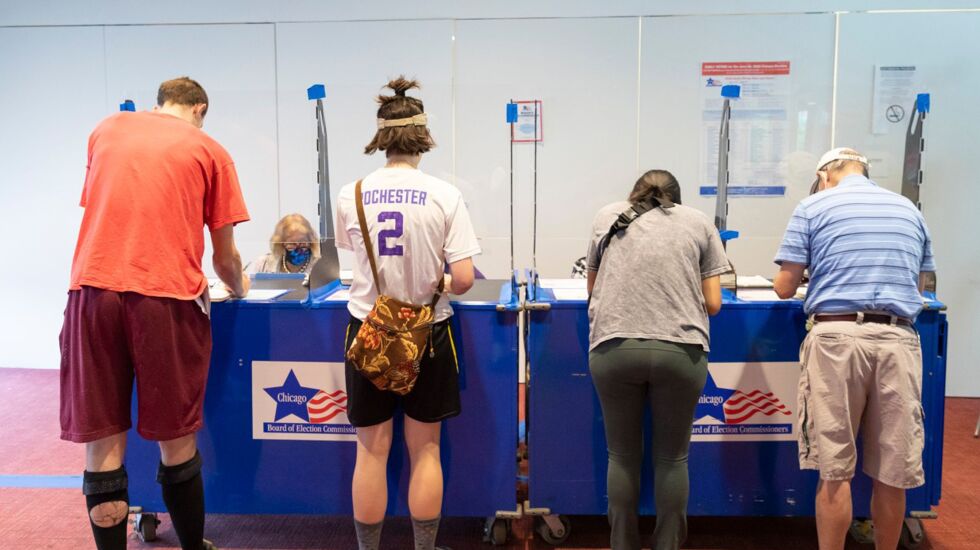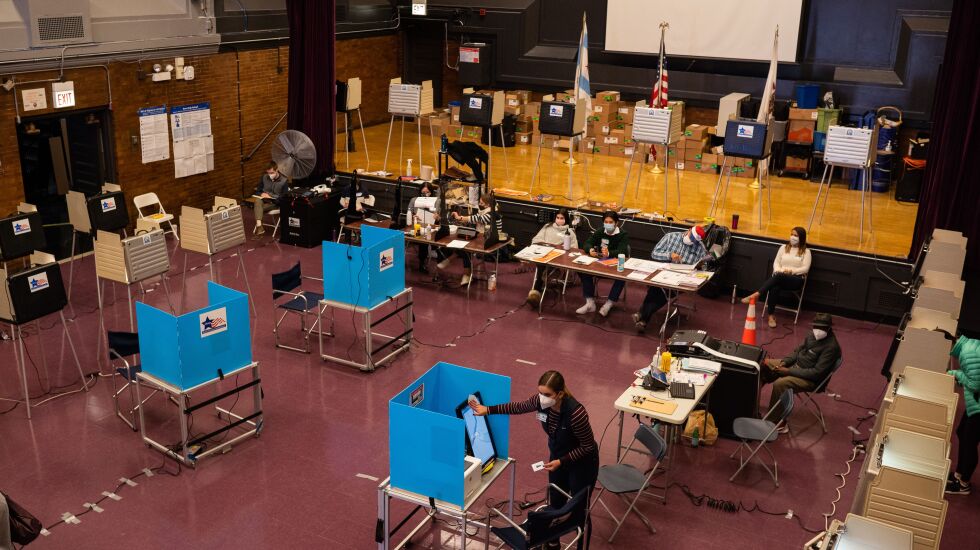
Chicago voters who need language support may be unpleasantly surprised on Election Day: Between the primaries in June and now, the agency that manages the city’s voting apparatus reduced the number of polling places that will provide bilingual ballots and election judges.
In the case of Tagalog, spoken by Filipinos, the number of voting precincts equipped to accommodate the language snapped down from 17 during the primary election to just one for the general.
Community and advocacy groups blame precinct consolidation by the Chicago Board of Election Commissioners, which cut the number of precincts from 2,069 to 1,290.
Mandated by a new state law, aimed partly at cutting administrative costs, precinct reduction has had a negative, if unintended, consequence for voters with limited English proficiency, they say.
About 15% of Chicago’s voting-age population is considered “limited English proficient,” according to data from the U.S. Census Bureau’s 2021 American Community Survey. However, for an entire precinct to be designated “limited English proficient,” at least 5% of the population must be “members of a single language minority group, have depressed literacy rates” and also “not speak English very well,” according to the U.S. Department of Justice. Voters in such precincts are entitled to bilingual printed materials and bilingual election judges.
“With recent consolidation, the precincts got larger, so there is a real likelihood that [limited English proficient] communities are being diluted” and no longer meet that 5% threshold, according to Kimberly Leung, the voting rights legal fellow at Asian Americans Advancing Justice Chicago, one of the groups sounding the alarm about language access for Asian immigrants in particular.
According to figures provided by the Chicago Board of Election Commissioners, the total number of limited English proficient precincts decreased from 970 in the June primary election to 623 in the general. While all covered languages — Spanish, Polish, Chinese, Hindi, Tagalog and Korean — saw reduced numbers of precincts, some communities experienced more drastic decreases than others.
Because the number of limited English proficient precincts have decreased, so have the number of such polling places, some of which accommodate more than one precinct.
An ‘Extreme Crunch’
Chicago Board of Election Commissioners spokesman Max Bever said the consolidation of limited English proficient precincts was done using community survey data — estimates based on sample size, not actual head counts of limited English proficient speakers.
Ami Gandhi, senior counsel for the Chicago Lawyers’ Committee for Civil Rights, said the survey data is “one piece of the puzzle, but paints an incomplete picture” because of factors including sample size, the census bureau’s access to hard-to-reach communities, margins of error and linguistic diversity. Input from community leaders, she said, can bring these nuances to light. “The provision of language assistance is always best done when it is determined by government authorities and community leaders being in conversation,” she said.

Leung, with Asian Americans Advancing Justice Chicago, agrees. She said many language precincts eliminated after falling short of the 5% threshold could have been saved had community members and organizations been consulted earlier. She said local groups know best where immigrant populations live and have historically voted. She also said securing language access for immigrant voters has been an ongoing issue, including the June primaries, during which the Board came under fire for not updating voter information on its website for various Asian languages.
“There is room for more strategic and meaningful community partnership” with the Chicago Board of Election Commissioners, Leung said. She added that U.S. Department of Justice guidelines “have made it clear that community engagement is critical to implementation” of Section 203 of the Voting Rights Act.
Bever, with the board, said the agency was under an “extreme crunch” to comply with a new state law increasing the number of voters per precinct. Bever said the lengthy and contentious ward redistricting process in the Chicago City Council added to the time constraints.
Though there was little time for “meaningful community engagement, Bever said, the board “did consult with City Council members for each ward to identify any potential voting access issues.”
He said several groups, including Asian Americans Advancing Justice Chicago, sent the Board a list of 27 precincts that may not meet the 5% threshold but could use additional language support.
While it is too late to print election materials in other languages for those 27 precincts for Nov. 8, Bever said, the board hopes to make those ballots available in the 2023 municipal election. However, he added, if the board recruits enough bilingual election judges, it will staff as many of those 27 precincts as possible this year.
Bever added that recruiting enough election judges has been a challenge overall, not just for the limited English proficient precincts. He noted that each precinct on Election Day will have one touchscreen machine with the ballot in 12 languages.
Language access is more than just translation
Al Cabagnot, 68, said these efforts are important, especially for older Filipino residents in Chicago. Although he is fluent in English, Cabagnot said “other seniors, especially from the provinces in the Philippines, and those who have just become a US citizen — they’re having a hard time understanding.”
Cabagnot said he and others have opted for the mail-in option and that often many Filipinos go to the polls in groups or have their families assist them on Election Day. However, he added, help is needed for those who missed the window for the mail-in ballots or don’t have family around.
Ryan Viloria, executive director of the Alliance of Filipinos for Immigrant Rights and Empowerment, said the city should leverage Filipino hubs like Seafood City, as well as engage more with the community. Language access, Viloria said, is more than a poll worker “simply pointing at the screen and hoping that you get the equivalent phrase” in another language.
He said while the Filipino population is spread out throughout the city “to the point of dilution,” they are part of a growing Asian population in Chicago and Illinois, and government officials should do more to reach them. Viloria said that while the city saved $2 million by consolidating precincts, that could ultimately overwhelm election judges, weaken language access, and “probably harms us more in the long run.”
He added: “If the city doesn’t care enough to help get Filipinos to the voting booths, do they really care about the Filipino political voice then?”
Esther Yoon-Ji Kang is a reporter on WBEZ’s Race, Class and Communities desk.







